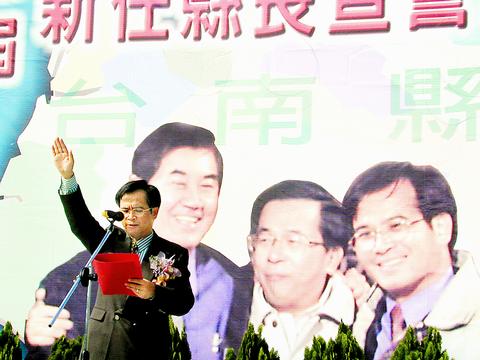The 23 county commissioners and city mayors elected in the Dec. 1 elections took their oaths of office yesterday. And in a sign of difficult times, most promised to boost their local economies.
The handover ceremonies were held under the auspices of the Ministry of the Interior in the requisite counties and cities across the country.
Taoyuan County's new commissioner, Chu Li-lun (朱立倫), said that he would deal with the top three problems he said Taoyuan residents are most concerned about: traffic, security and financial difficulties.

PHOTO: CHEN CHUN-SHENG, TAIPEI TIMES
He said that the Taoyuan County Government will bring more bus-inesses into the county and promised to shorten the application process to obtain permission to build plants in the county.
The new DPP commissioner in Chiayi County, Chen Ming-wen(陳明文), said that since Chiayi is primarily an agricultural region, his government will face tough challenges upgrading the sector to deal with Taiwan's entry into the WTO. He added, however, that "Crisis also means opportunity. I believe that if we cooperate with each other, we will meet the challenges."
The incoming DPP commissioner of Tainan County, Su Huan-chih (蘇煥智), made the same promise in his mainly agricultural county.
Su also promised to establish a biotech park and, like his predecessor Chen Tang-shan (陳唐山), "to bring business from all over Taiwan" into the county.
In Taipei County, re-elected DPP commissioner Su Tseng-chang (蘇貞昌) promised to improve the county's investment environment.
"I will spend every penny appropriately, strengthen the government's administrative efficiency, create more job opportunities and push for greater cooperation between the central and local governments," Su said.
In Miaoli County, independent Commissioner Fu Hseuh-peng (傅學鵬) proposed four goals for Miaoli, including building a university and developing technology, tourism and welfare.
In Hsinchu City, KMT Mayor Lin Cheng-tse (林政則) emphasized his social welfare policy, promising an increase in subsidies for the elderly and women's maternity allowances.
In Taichung City, outgoing mayor Chang Wen-ying (張溫鷹) said she hopes the newly elected mayor, Jason Hu, will help Taichung overtake Kaohsiung and Taipei to become Taiwan's "top city."
The DPP, which controlled 12 districts in 1997, won just nine city and county districts this time around. The KMT, which previously controlled eight counties, was victorious in nine districts.
Independent candidates and the People First Party captured two districts each, while the New Party took only Kinmen County.
Local heads have complained bitterly about their financial plight since the election. Many local government are heavily reliant on loans.
Premier Chang Chun-hsiung (張俊雄) promised at a meeting with all of the newly elected leaders last Sunday that the Cabinet will adopt measures to help them cope with their fiscal woes.
Emotional incidents, however, marred the ceremonies in Taoyuan, Hsinchu and Chiayi.
In Chiayi County, outgoing commissioner Lee Ya-ching (李雅景) failed to attend the handover ceremony for "personal reasons." In Taoyuan County, a county councilor heckled outgoing commissioner Hsu Ying-shen (許應深) during his speech and in Hsinchu County, the newly elected commissioner's supporters implored the outgoing commissioner, Lin Kuang-hua (林光華), to end his speech after he had spoken for over an hour.

MAKING WAVES: China’s maritime militia could become a nontraditional threat in war, clogging up shipping lanes to prevent US or Japanese intervention, a report said About 1,900 Chinese ships flying flags of convenience and fishing vessels that participated in China’s military exercises around Taiwan last month and in January last year have been listed for monitoring, Coast Guard Administration (CGA) Deputy Director-General Hsieh Ching-chin (謝慶欽) said yesterday. Following amendments to the Commercial Port Act (商港法) and the Law of Ships (船舶法) last month, the CGA can designate possible berthing areas or deny ports of call for vessels suspected of loitering around areas where undersea cables can be accessed, Oceans Affairs Council Minister Kuan Bi-ling (管碧玲) said. The list of suspected ships, originally 300, had risen to about

DAREDEVIL: Honnold said it had always been a dream of his to climb Taipei 101, while a Netflix producer said the skyscraper was ‘a real icon of this country’ US climber Alex Honnold yesterday took on Taiwan’s tallest building, becoming the first person to scale Taipei 101 without a rope, harness or safety net. Hundreds of spectators gathered at the base of the 101-story skyscraper to watch Honnold, 40, embark on his daredevil feat, which was also broadcast live on Netflix. Dressed in a red T-shirt and yellow custom-made climbing shoes, Honnold swiftly moved up the southeast face of the glass and steel building. At one point, he stepped onto a platform midway up to wave down at fans and onlookers who were taking photos. People watching from inside

Japan’s strategic alliance with the US would collapse if Tokyo were to turn away from a conflict in Taiwan, Japanese Prime Minister Sanae Takaichi said yesterday, but distanced herself from previous comments that suggested a possible military response in such an event. Takaichi expressed her latest views on a nationally broadcast TV program late on Monday, where an opposition party leader criticized her for igniting tensions with China with the earlier remarks. Ties between Japan and China have sunk to the worst level in years after Takaichi said in November that a hypothetical Chinese attack on Taiwan could bring about a Japanese

The WHO ignored early COVID-19 warnings from Taiwan, US Deputy Secretary of Health and Human Services Jim O’Neill said on Friday, as part of justification for Washington withdrawing from the global health body. US Secretary of State Marco Rubio on Thursday said that the US was pulling out of the UN agency, as it failed to fulfill its responsibilities during the COVID-19 pandemic. The WHO “ignored early COVID warnings from Taiwan in 2019 by pretending Taiwan did not exist, O’Neill wrote on X on Friday, Taiwan time. “It ignored rigorous science and promoted lockdowns.” The US will “continue international coordination on infectious